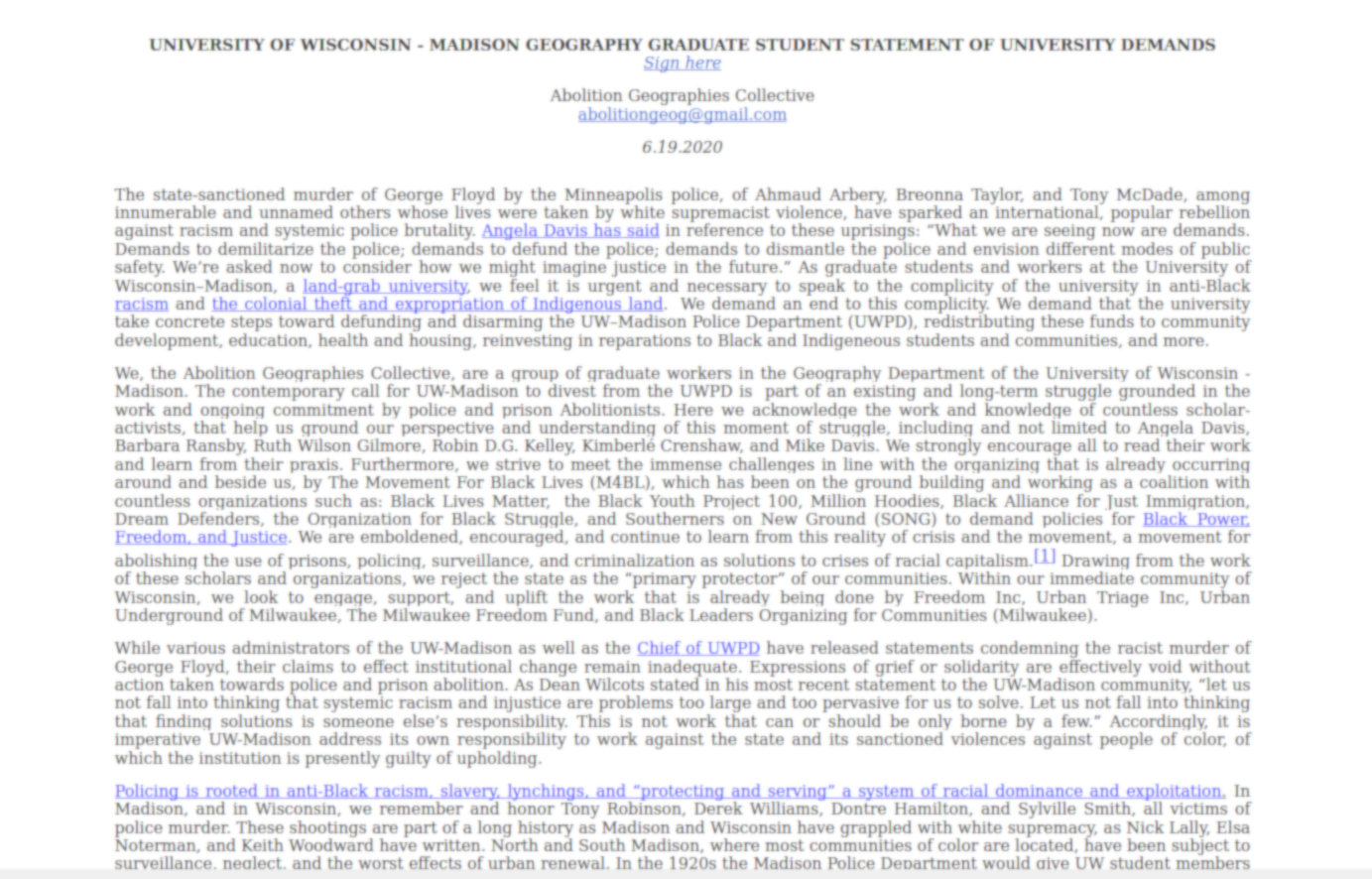TAA endorses AGC Statement

On August 22nd, 2020, The Teaching Assistants’ Association (TAA) Executive Board voted to sign the Abolition Geographies Collective’s Statement of University Demands. This statement calls to abolish and divest from the University of Wisconsin’s Police Department (UWPD), military funding, and reinvest in Black and Indigenous students and communities. The TAA included this in our demands for a Safe Restart in the Fall of 2020.
Follow the link to read the full statement: https://bit.ly/2AJSN3I
Who keeps us safe? WE keep us safe!
We stand in solidarity with the AGC demands for divestment and reinvestment which go as follows:
DIVEST
- We demand that UW-Madison abolish the UWPD. This involves the defunding and divestment from the UW Police Department and investment of these funds from policing toward racial and gender justice teaching, research, and community initiatives as well as increased material support for Black faculty, staff, students, and workers on campus. The plan for the redirection of both immediate and ongoing resources should be developed by faculty experts in the field of Black and Ethnic Studies on campus as well as student, staff, worker, and community stakeholders.
- We demand an inquiry into and divestment from all educational programs and partnerships with ties to the police and military. Specifically, we demand that the UW end any collaboration with the Madison Police Department, the Federal Bureau of Investigation’s (FBI) Future Law Enforcement Youth Academy, and the Department of Homeland Security.
- We demand that the UW-Madison address and halt investments in companies that profit from the violation of human rights in the United States and internationally—including those with ties to the state of Israel, the Dakota Access Pipeline, and private prisons—as well as advocating for UW-Madison faculty and students whose work challenges these brutalizing and genodical systems.
INVEST & REINVEST
- We demand the financial support of Black students, faculty, and staff through direct funding, student organization funding, and funding for departments geared toward the support of Black communities.
- We demand the university to recognize the singular importance of Black and Ethnic Studies, not only in its work towards racial justice, but also in reimagining the university itself. This includes the financial compensation of Black employees with tenure considerations for their unrecognized labor in mentoring, counseling, and engaging with students, in addition to their participation in multiple diversity efforts and committees.
- We demand that non-Black staff, faculty, and administration take responsibility to proactively engage in anti-racist initiatives backed by self and institutionally led education to shift labor off of Black individuals.
- We demand the creation of a policy that protects students that protest in the course of community-based activism on campus and disavows forms of intimidation including but not limited to, police brutality, threats of expulsion or suspension by the university.
- We demand the formation of a committee to investigate avenues for reparations and demand that the university make sustained reparations to both Black and Indigenous communities, including but not limited to Freedom, Inc. and Urban Triage.
- When university hires are being considered, one’s record with racial justice and injustices must be a major consideration. When Jim Johnson was put forward as the only candidate for the UW-System President, it was revealed that he had received multiple no confidence votes from faculty at different branch campuses and students in no small part because his graduation rates for black students were below 15%. While we recognize this position is filled by the Regents, we expect that any worker of the UW system (administrator, faculty, graduates, staff) should be subject to scrutiny of their history of racial justice and injustices. And when said expectation does not occur, we demand that allies stand in solidarity to not let racist leaders dictate our institution.
- We demand a campus-wide centralized approach to addressing these systemic issues, identifying the decentralized campus as negligent and oppressive. This very structure in 2018, was identified as a barrier to addressing sexual misconduct on campus, “We have a huge and very decentralized campus. As I’ve noted before, this university – students, staff and faculty – is about the size of Janesville. Because of this size, it is inevitable that some bad things will happen here, despite all of our efforts.” Current efforts are inadequate. “Bad things,” such as anti-black racism, racial violence, and gendered-violence are not inevitable. They are products of the current institutional structures of the university. By not changing these structures, UW-Madison is complicit and responsible for these violences. The decentralized campus is dangerous and limits the opportunities for groups–administration, employees, faculty, staff, and students–across campus to build coalitions and operationalize real institutional change.
